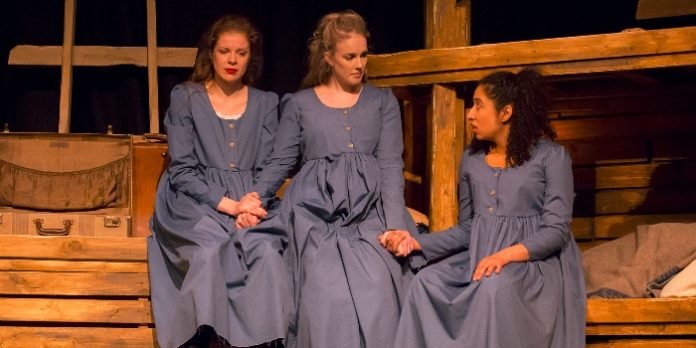The best thing about Jaki McCarrick’s Belfast Girls is its history lesson.
Set in 1850 against the backdrop of the Great Famine in Ireland, Belfast Girls follows five fictional women who choose to leave that city for what they hope will be a better life. This isn’t the story of the huddled masses escaping to the United States though, this is the lesser known scheme to transport orphaned young women from Ireland to Australia.
We soon discover though these five women, and many others like them aboard the Inchinnan, are not the innocent young women who were the purported targets of what become known as the Earl Grey orphan scheme.
As McCarrick painstakingly points out, the political reality appears to be quite different and definitely less altruistic. As it becomes evident, Ireland is ridding itself of some of its less desirable. It is within this context McCarrick’s drama is the most powerful. As we discover more about these women, are their dreams of a new life no less worthy?
But this is largely an intellectual exercise, as while there are a couple of beautifully heartfelt moments in Belfast Girls, this production never quite manifests the necessary emotional connection. Even as the character study of act one gives way to some action in the second, by the time the quintet arrives at Australia’s shore we are never fully invested in the outcome. The stakes may be life-changing, but the reality of this journey never quite gets us there.
Much of the tension in Belfast Girls must come from the relationships between the women. This requires a skilled set of actors to carry it off. While Director Wendy Bollard has assembled a cast who are mostly up to its challenge, there is little build to the inevitable clashes between them. The result is an abruptness, especially in the more robust scenes, which often felt melodramatic and contrived.
The quieter moments are much more successful, as in one particularly beautiful scene in act one between Molly (Olivia Sara Grace) and Sarah (Amelia Ross). Grace is particularly good here, introspective and thoughtful. Tegan Verheul and Paige Gibbs are perfectly matched, providing the necessary comedic respite, although Verheul has a tough sell as “Fat” Hannah.
As the de facto leader of the women, Mariam Barry has a difficult time as the Jamaican-born, Irish-raised Judith. While each of the actors struggle at times with their Irish accent, Barry’s Irish lilt becomes stodgy and staged. As McCarrick’s political commentator, Barry also gets inside her head a little too much.
Corina Akeson provides some nice transitional music and sound effects, and while Nicole Weismiller’s lighting design has a gentle golden hue, it felt all too bright for the cramped ship’s quarters. Andy Sorensen’s set design is evocative, but it was a shame it was necessary to erect the accordion wing at stage right.
Like the long voyage these women took from Ireland to Australia, Belfast Girls is a sometimes tedious, often rocky journey. It is nonetheless a fascinating piece of history.
Belfast Girls by Jaki McCarrick. Directed by Wendy Bollard. A Peninsula Productions presentation on stage at The Cultch’s Vancity Culture Lab until March 18. Visit https://thecultch.com for tickets and information.

